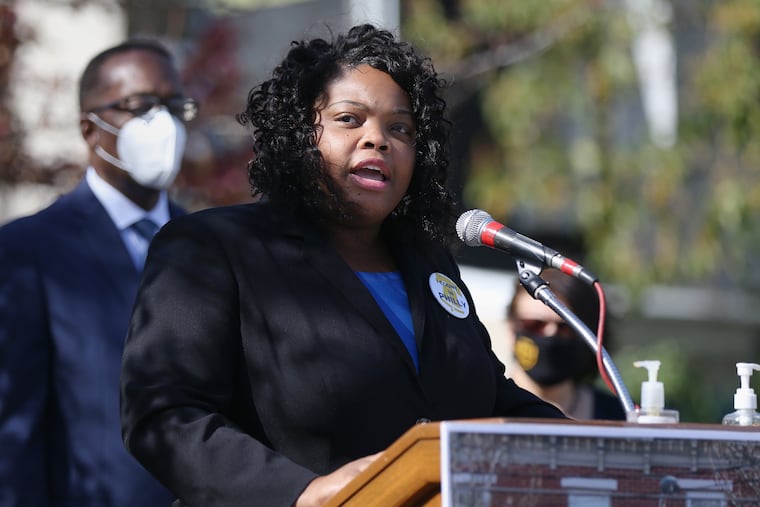Philadelphia’s pension led on guns and private prisons. Could fossil fuel divestment be next? | Editorial
The Philadelphia Board of Pensions has been on the frontline of a few social causes. Exploring what’s next for fossil fuels is a natural fit.

The Philadelphia pension fund had its best year ever in 2020. Preliminary figures suggest that returns exceeded 25% and that the fund grew by about $1 billion to $7 billion. Now, from a position of strength, Philadelphia has an opportunity to reassess its investment in fossil fuels.
In April, spurred by a resolution introduced by Councilmember Katherine Gilmore Richardson, the Board of Pensions and Retirement added sustainable investment language to its investment policy. This means that when possible, the board will consider corporate governance (such as a diversity of a company and its board), environmental factors (such as impact on climate change), and social and human factors (such as worker conditions).
The language is important because Philadelphia shouldn’t invest in companies that go against the city’s values — and should provide capital to companies that share a vision with the city. But the language alone doesn’t change much. It makes explicit the type of considerations that are often already taken into account by the board.
» READ MORE: Can Philadelphia’s gas utility survive in a climate where fossil fuels are shunned?
When the City of Pittsburgh announced a similar policy, it also announced its intent to fully divest from fossil fuel — a measurable result. The effort had been three years in the making, building up an investment strategy that places environmental, social, and governance considerations alongside returns and risk. New York City is divesting $4 billion from fossil fuels. Last month, Maine passed a law ordering public pensions to dump any fossil fuel stock they have by 2026. Divesting from fossil fuel sends a strong message to the market that the era of drill-baby-drill is over.
Philadelphia’s Board of Pensions has been a leader in some divestment campaigns.
After the 2012 massacre in the Sandy Hook Elementary School in Newtown, Conn., in which 26 people were murdered including 20 children under age 7, Mayor Michael Nutter’s administration developed the “Sandy Hook Principles.” Modeled after the “Sullivan Principles” that were written in Philadelphia by the Rev. Leon H. Sullivan to pressure South Africa to end apartheid, the principles are a set of pledges for firearms manufacturers and traders to talk about gun safety and corporate behavior including pushing for stricter gun control and ending the sale or design of assault weapons.
In 2013, Philadelphia’s Board of Pensions adopted the principles. Since then, the board has reached out to companies in the gun industry and asked them to adopt the principles as a condition for investment. Of about 40 companies covered by the policy, only one adopted the principles.
Additionally, in 2017, the Board of Pensions voted to divest from private prisons, liquidating $1.2 million of stocks and investing them elsewhere. And in 2019, Philadelphia pulled $54 million from a money manager who made sexist comments.
It’s not simple for a pension to make these kind of value-based investment decisions. Ultimately, the Board of Pensions has a fiduciary duty to its beneficiaries — the current and former employees of the City of Philadelphia whose financial futures depend on the fund’s performance. Deciding overnight to take an action such as divesting while knowing it might hurt the performance of the fund is not only irresponsible, it’s illegal. That’s why any categorical policy around fossil fuels must be handled with care.
» READ MORE: PGW is at crossroads — and that should concern everyone | Opinion
The Board of Pensions should conduct or commission a full audit of its fossil fuel exposure. Depending on the pollution that Philadelphia currently funds, and how direct that funding is, the board might choose to not have a fossil fuel-specific policy, push for behavior change (as it did with Sandy Hook), or divest (as it did with private prisons). This effort should be part of a larger look at the city’s fossil fuel dependence — including the future of the Philadelphia-owned fossil fuel company, PGW.
In recent years Philadelphia’s Board of Pensions cut the investment in the energy sector by half — down to 6%, with coal representing only 0.25%. One reason for the decrease is that stocks of fossil fuel companies are just not performing very well. Meanwhile, the market for clean and renewable energy stocks is booming. Far from a sacrifice, divesting in fossil fuels might be an opportunity.
The investments of the pension funds are a critical tool for Philadelphia to have a positive impact on the market. The Philadelphia Board of Pensions has been on the front line of a few social causes. Exploring what’s next for fossil fuels is a natural fit.